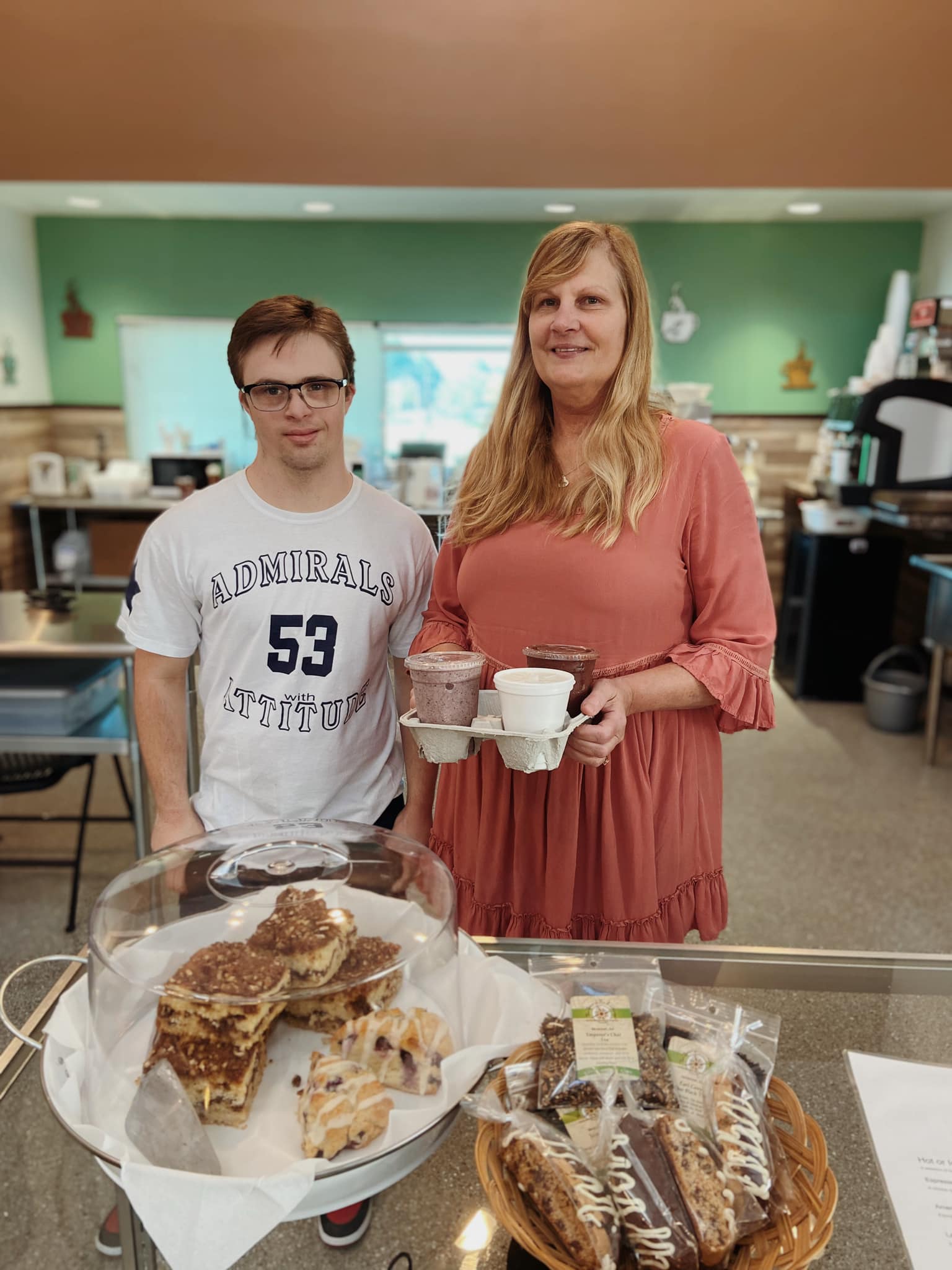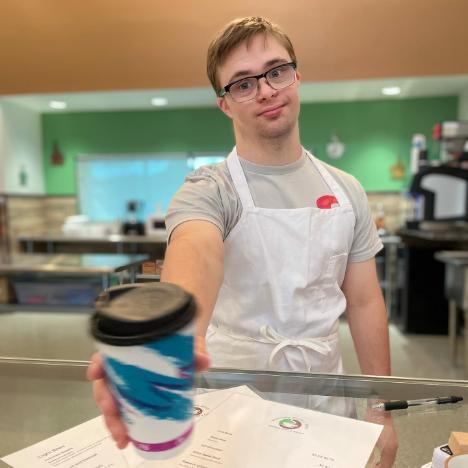Whole Latte Love in Riverside Coffee Shop
Alum Angela Lee Creates Coffee Shop That Cares

McDonald’s maybe. Or the local movie theater. Maybe bussing tables at a local restaurant. And then there was always babysitting. What was yours? First jobs are an initial step toward independence that are something of a right of passage for most teenagers. But sometimes circumstances conspire against the anxious and the willing. A pandemic can do that. So can a disability.
For Tristan Lee, it was both. Tristan was born with Down Syndrome, a condition that informed the decision of his mother, Angela Lee, to obtain a master’s degree in special education from Touro University California’s Graduate School of Education (GSOE). She graduated in 2012.
But her Touro master’s degree wasn’t the end of the educational line for Lee. She said she was inspired by her professor, Touro’s Dr. Linda Haymes, to seek further schooling.
“Linda was just so smart and helpful and she inspired me to become a BA,” Lee said.
Lee continued her education, becoming a Board Certified Behavior Analyst in 2016. But helping Tristan with his goals and dreams, particularly during a global pandemic, proved – as one might expect – rather elusive.
“The lockdown beginning in 2020 was especially hard on kids like Tristan,” Lee said. “He was basically sitting at home playing video games all day.”
Lee explained that although online school was available at times, it was difficult for Tristan to navigate computer-based learning and he was at times baffled by processes and his teachers’ directions. The situation was frustrating for everyone.
Given her education and experience, Lee was especially dismayed that she was unable to help Tristan to meaningfully occupy himself during the pandemic; not to mention addressing his growing fascination with the idea of getting a job – particularly his dream job: working at Starbucks.
“For a while, I took him with me to the clinic where I was working,” Lee explained. “They were very supportive. But it didn’t really work out and Tristan wanted so badly to work at Starbucks.”

For Tristan, who was 18 at the time, the idea of working at Starbucks became something of an obsession. Yet, Lee knew her son’s limitations even while understanding how much the dream of becoming a barista meant him.
So, what does a parent do when their developmentally disabled child’s dream to work in a coffee shop is unattainable?
“He (Tristan) wanted to work in a coffee shop, so we decided to make him his own coffee shop,” Lee said with a chuckle.
But this was to be no ordinary coffee shop.
Today, the Riverside Coffee Shop in Lenoir City, a suburb of Knoxville, Tennessee is open for business not only as a functioning coffee and snack shop, but also as a vocational training program for neurodivergent and disabled youth and young adults.
Lee is both educator and employer. Her program is called ABA Next Steps and speaks to the desire of so many disabled individuals to simply engage in meaningful work they enjoy. Yet, for these same motivated individuals the challenges of working in an environment where direction can be confusing and tasks sometimes troublesome too often comes to a disappointing end.
Through the Riverside Coffee Shop and the ABA Next Steps program, Lee hopes to teach to her students the social and behavioral skills others – especially employers – take for granted in an employee.
“About 95 percent of the problems individuals with developmental issues have as workers is behavioral,” Lee said. “And for the most part, those skills can be taught.”
Non-compliance is another oft-cited reason for job loss, but Lee said that too can be addressed. Still, the onus for overcoming stumbling blocks between employer and an employee living with a disability doesn’t just lie with the worker, according to Lee.
“Sometimes employers need to be taught about environmental modifications and tactics for working with someone with autism or someone with a learning disability,” Lee said.
And she is there to provide that service as well. In fact, Lee’s entire philosophy is one of inclusion and simply serving her students and the overall community at the same time.
“I’ll train anybody,” Lee said. “I do need to know a diagnosis so I can best teach them, but I’m here for anyone.”
The training program is taught in eight-week blocks and focuses on skill-gaps that may limit an individual’s ability to find or keep a job. During their time with ABA Next Steps, students have an opportunity to learn the coffee-shop business through and through, while also gaining basic job skills like cooperating with coworkers, taking direction, dealing with customers, and much, much more.
The skills she teaches should translate to a variety of jobs, and in fact, Lee herself hopes to provide some of those jobs in the future. She envisions adding onto the coffee shop with other businesses that would also teach and employ her students.
“I’d love to have many other options for my clients,” Lee said. “Maybe a florist shop or some kind of gardening service. Maybe a doggy daycare.”
Such expansive - and some might say lofty - goals could not be more needed within the disabled community. In fact, while the adult unemployment rate in the United States hovers around five percent, the employment rate in the disabled community is about the same.
That shocking 95 percent unemployment rate is exactly what Lee is trying to combat through her ABA Next Steps program and the Riverside Coffee Shop. But ABA Next Steps aims to provide much more than what has been offered to disabled and neurodivergent individuals in the past.
“I want all of my students to be able to have more choices than just bagging groceries or mopping floors,” Lee said. She is quick to point out that those two choices are fine if they are what an individual – disabled or otherwise – wants to do but, “It’s about having more choices. It’s about being able to do something that they actually like to do,” Lee said.
Working at Riverside Coffee Shop is something Tristan, Lee’s students, and even her and family members definitely like to do. Lee’s husband, Bill, retired from the California Department of Justice, handled most of the coffee shop construction and her daughter, Faith, works full-time as shop manager.
For now, Lee has only a small group of students/employees with a variety of different challenges including everything from Down Syndrome to Traumatic Brain Injury, to Brittle Bone Disease, but as her business – officially a 501(c)(3) nonprofit – receives more attention, she is already adding to her client list.
Parents enrolling their young adult and adult children in Lee’s program quickly learn the ways in which the Riverside Coffee Shop serves customers and student-workers. But members of the public will likely never know about things like the shop’s “sensory room” where workers can go do when they need a minute to regroup or escape sensory overload, along with other accommodations meant to facilitate vocational training while addressing student needs.
In fact, everything about the Riverside Coffee Shop is designed to not only meet the needs of the student-employees, but also to make the learning process as incremental, thorough, and stress free as possible. Lee said she focuses on breaking larger skills and tasks into manageable steps. That’s why coffee shop employees learn bits and pieces of jobs before being asked to perform a sequence of tasks.
Indeed, it’s the process of doing a series of duties that often trips up disabled employees, especially those in the workforce for the first time. It’s an issue Lee aims to combat and defeat in her program.
After many years in the workforce, Lee has built an arsenal of tactics to tackle educational and behavioral issues in her clients. But her skills all began with her education at Touro, she said.
“My experience at Touro was extremely positive,” Lee recalled. “I loved the small class sizes and loved my cohort. And I was absolutely inspired – especially by Linda Haymes – to become a behavior analyst.”
The admiration Lee has for Dr. Haymes extends both ways.
“When Angela was a student at Touro in the GSOE, she was an impressive go getter that approached inclusion, autism, and behavior analysis with wide a lens; looking at life skills and goals for neurodiverse individuals” Dr. Haymes said. “No surprise that she went on to create inclusive work experiences for neurodiverse individuals, impacting their lives and the community. I am so proud of her accomplishment and proud she is a Touro alumni.”
And if Riverside Coffee Shop is any indication, Lee’s accomplishments are only beginning.
